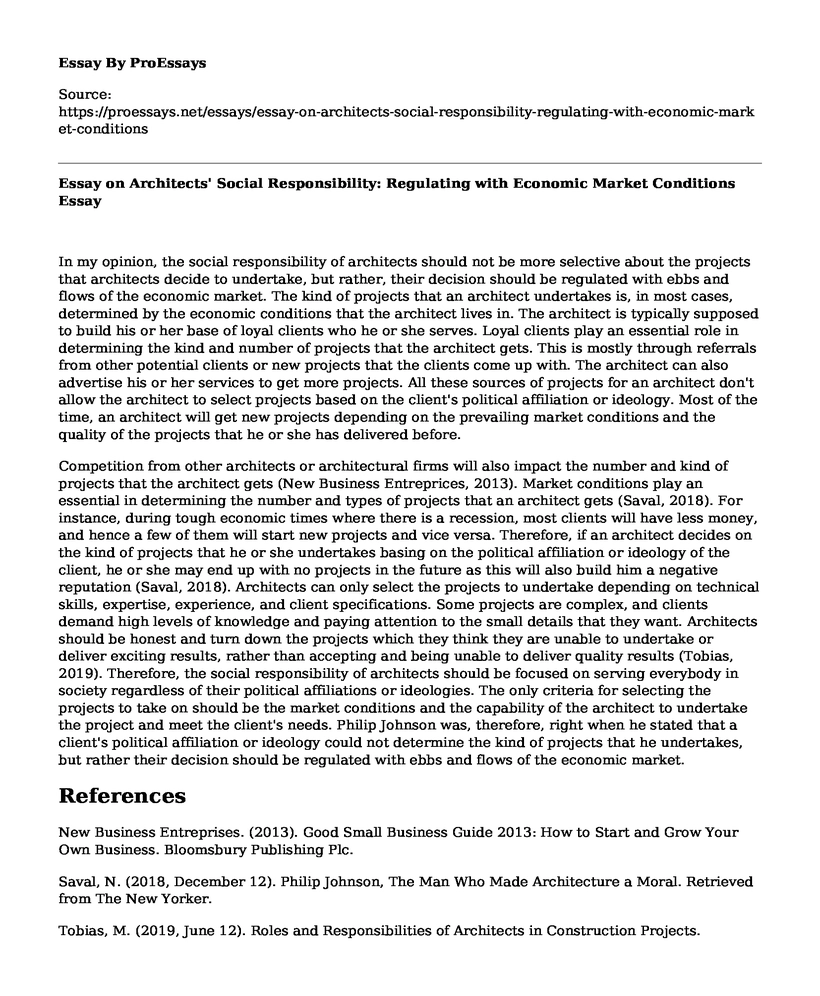In my opinion, the social responsibility of architects should not be more selective about the projects that architects decide to undertake, but rather, their decision should be regulated with ebbs and flows of the economic market. The kind of projects that an architect undertakes is, in most cases, determined by the economic conditions that the architect lives in. The architect is typically supposed to build his or her base of loyal clients who he or she serves. Loyal clients play an essential role in determining the kind and number of projects that the architect gets. This is mostly through referrals from other potential clients or new projects that the clients come up with. The architect can also advertise his or her services to get more projects. All these sources of projects for an architect don't allow the architect to select projects based on the client's political affiliation or ideology. Most of the time, an architect will get new projects depending on the prevailing market conditions and the quality of the projects that he or she has delivered before.
Competition from other architects or architectural firms will also impact the number and kind of projects that the architect gets (New Business Entreprices, 2013). Market conditions play an essential in determining the number and types of projects that an architect gets (Saval, 2018). For instance, during tough economic times where there is a recession, most clients will have less money, and hence a few of them will start new projects and vice versa. Therefore, if an architect decides on the kind of projects that he or she undertakes basing on the political affiliation or ideology of the client, he or she may end up with no projects in the future as this will also build him a negative reputation (Saval, 2018). Architects can only select the projects to undertake depending on technical skills, expertise, experience, and client specifications. Some projects are complex, and clients demand high levels of knowledge and paying attention to the small details that they want. Architects should be honest and turn down the projects which they think they are unable to undertake or deliver exciting results, rather than accepting and being unable to deliver quality results (Tobias, 2019). Therefore, the social responsibility of architects should be focused on serving everybody in society regardless of their political affiliations or ideologies. The only criteria for selecting the projects to take on should be the market conditions and the capability of the architect to undertake the project and meet the client's needs. Philip Johnson was, therefore, right when he stated that a client's political affiliation or ideology could not determine the kind of projects that he undertakes, but rather their decision should be regulated with ebbs and flows of the economic market.
References
New Business Entreprises. (2013). Good Small Business Guide 2013: How to Start and Grow Your Own Business. Bloomsbury Publishing Plc.
Saval, N. (2018, December 12). Philip Johnson, The Man Who Made Architecture a Moral. Retrieved from The New Yorker.
Tobias, M. (2019, June 12). Roles and Responsibilities of Architects in Construction Projects. Retrieved from NY-Engineers.
Cite this page
Essay on Architects' Social Responsibility: Regulating with Economic Market Conditions. (2023, May 23). Retrieved from https://proessays.net/essays/essay-on-architects-social-responsibility-regulating-with-economic-market-conditions
If you are the original author of this essay and no longer wish to have it published on the ProEssays website, please click below to request its removal:
- Career Plan in Human Resource Management
- Job Analysis Research on the Veterinary Medicine Example
- Fashion is a Practice That Individuals Use to Express Identity
- Rosenblum's Contentions on Photography and Art
- Essay Sample on Grief and Loss Theory in Social Work Practice
- Essay Example on IKEA Facing Human Rights Complaint at The Hague
- Paper Example on Demographic Analysis: Gender Distribution in 13 Ministries







